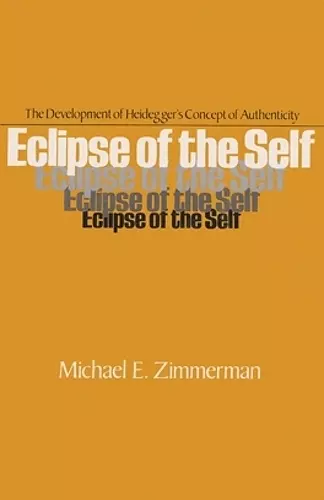Eclipse of the Self
The Development of Heidegger’s Concept of Authenticity
Format:Paperback
Publisher:Ohio University Press
Published:1st Jan '86
Currently unavailable, and unfortunately no date known when it will be back

Although it is sometimes said that Martin Heidegger’s later philosophy no longer concerned itself with the theme of authenticity so crucial to Being and Time (1927), this book argues that his interest in authenticity was always strong.After
Although it is sometimes said that Martin Heidegger’s later philosophy no longer concerned itself with the theme of authenticity so crucial to Being and Time (1927), this book argues that his interest in authenticity was always strong.
After leaving the seminary to become a philosophy student, Heidegger began to “de–mythologize” religious themes for his own philosophical purposes. Like the Christian notion of faith, Heidegger’s notion of authenticity involves relinquishing the egotistical self–understanding which blocks our openness for possibilities. Yet authenticity as “resoluteness” includes an element of voluntarism foreign to the idea of faith. Heidegger’s brief engagement with National Socialism (1933–1934) helped him to re–think the Nietzschean concept of will which had influenced his early views on authenticity. Although part of the meaning of resoluteness is to allow things to be revealed, it also suggests that an individual can somehow will to be authentic. After about 1936, Heidegger emphasized that an individual can only be released from egoism (inauthenticity) by a power which transcends him. The abiding theological issue concerning the efficacy of works as against the saving power of grace finds expression in the distinction between resoluteness and releasement.
“Michael Zimmerman’s Eclipse of the Self is a Heidegger study that is remarkable for its strong scholarly foundations, its newness of approach, and—thanks to exceptional clarity of style—its accessibility to a broad reading public.”
“Zimmerman’s book… certainly offers an indispensable point of departure for anyone wishing to study the role of authenticity, resp. inauthenticity, in Heidegger’s thought; it is to be recommended on account of erudition and eminent readability.” * Tijdschrift Voor Filosofie *
“This book deserves praise for its challenging presentation of Heidegger’s ideas, and because it is a thoughtful and independent contribution to that larger dialogue” * Canadian Philosophical Reviews *
ISBN: 9780821406014
Dimensions: unknown
Weight: unknown
357 pages